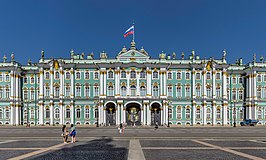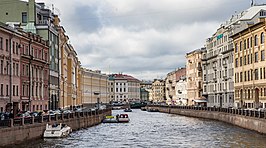Saint Petersburg
Санкт-Петербург | |
|---|---|
Clockwise from top: the Winter Palace; Peter and Paul Cathedral; the General Staff Building; the Moyka River from the Pevchesky Bridge to the Red Bridge; Saint Isaac's Cathedral; and Palace Bridge | |
| Anthem: "Anthem of Saint Petersburg" | |
 | |
 Location of Saint Petersburg in European Russia | |
| Coordinates: 59°56′15″N 30°18′31″E / 59.93750°N 30.30861°E | |
| Country | |
| Federal district | Northwestern |
| Economic region | Northwestern |
| Founded | 27 May 1703[1] |
| City raions | See list |
| Government | |
| • Body | Legislative Assembly |
| • Governor | Alexander Beglov[2] (UR) |
| Area | |
| 1,439 km2 (556 sq mi) | |
| Elevation | 3 m (10 ft) |
| Population | |
| • Rank | 4th in Europe 2nd in Russia |
| • Density | 3,992.81/km2 (10,341.3/sq mi) |
| • Metro | |
| Demonym | Petersburgian |
| GDP | |
| • Federal city | ₽11.17 trillion (US$151.61 billion) (2022) |
| • Per capita | ₽1.99 million (US$27,054.88) (2022) |
| Time zone | UTC+3 (MSK[6]) |
| Postal code | 190000—199406 |
| Area code | 812 |
| ISO 3166 code | RU-SPE |
| Vehicle registration | 78, 98, 178, 198 |
| OKATO ID | 40 |
| OKTMO ID | 40000000 |
| Official language | Russian[b] |
| Website | gov |
Saint Petersburg,[c] formerly known as Petrograd and later Leningrad,[d] is the second-largest city in Russia after Moscow. It is situated on the River Neva, at the head of the Gulf of Finland on the Baltic Sea. The city had a population of 5,601,911 residents as of 2021,[4] with more than 6.4 million people living in the metropolitan area. Saint Petersburg is the fourth-most populous city in Europe, the most populous city on the Baltic Sea, and the world's northernmost city of more than 1 million residents. As the former capital of Imperial Russia, and a historically strategic port, it is governed as a federal city.
The city was founded by Tsar Peter the Great on 27 May 1703 on the site of a captured Swedish fortress, and was named after the apostle Saint Peter.[8] In Russia, Saint Petersburg is historically and culturally associated with the birth of the Russian Empire and Russia's entry into modern history as a European great power.[9] It served as a capital of the Tsardom of Russia, and the subsequent Russian Empire, from 1712 to 1918 (being replaced by Moscow for a short period of time between 1728 and 1730).[10] After the October Revolution in 1917, the Bolsheviks moved their government to Moscow.[11] The city was renamed Leningrad after Lenin's death in 1924. It was the site of the siege of Leningrad during the Second World War, the most lethal siege in history.[12] In June 1991, only a few months before the Belovezha Accords and the dissolution of the USSR, voters supported restoring the city's original appellation in a city-wide referendum.[13]
As Russia's cultural centre,[14] Saint Petersburg received over 15 million tourists in 2018.[15][16] It is considered an important economic, scientific, and tourism centre of Russia and Europe. In modern times, the city has the nickname of being "the Northern Capital of Russia" and is home to notable federal government bodies such as the Constitutional Court of Russia and the Heraldic Council of the President of the Russian Federation. It is also a seat for the National Library of Russia and a planned location for the Supreme Court of Russia, as well as the home to the headquarters of the Russian Navy, and the Leningrad Military District of the Russian Armed Forces. The Historic Centre of Saint Petersburg and Related Groups of Monuments constitute a UNESCO World Heritage Site. Saint Petersburg is home to the Hermitage, one of the largest art museums in the world, the Lakhta Center, the tallest skyscraper in Europe, and was one of the host cities of the 2018 FIFA World Cup and the UEFA Euro 2020.
- ^ Official website of St. Petersburg. St. Petersburg in Figures Archived 19 February 2009 at the Wayback Machine
- ^ "Putin appointed an official from the "LPR" as the head of Chukotka". Novaya Gazeta Europe (in Russian). 15 March 2023. Archived from the original on 15 March 2023. Retrieved 15 March 2023.
- ^ "Численность населения регионов и городских агломераций | Институт экономики города" (PDF). www.urbaneconomics.ru. Archived from the original (PDF) on 29 March 2023. Retrieved 18 March 2023.
- ^ a b "Оценка численности постоянного населения по субъектам Российской Федерации". Federal State Statistics Service. Archived from the original on 1 September 2022. Retrieved 1 September 2022.
- ^ Валовой региональный продукт по субъектам Российской Федерации в 2016-2022 гг., rosstat.gov.ru
- ^ "Об исчислении времени". Официальный интернет-портал правовой информации (in Russian). Archived from the original on 22 June 2020. Retrieved 19 January 2019.
- ^ "Petersburg". Collins English Dictionary. HarperCollins. Archived from the original on 4 March 2018. Retrieved 16 March 2023.
- ^ Shevchenko, Elizaveta (11 October 2021). "The Five Names of St. Petersburg". news.itmo.ru (in Russian). Retrieved 28 October 2023.
- ^ Sobchak, Anatoly. Город четырех революций – Дух преобразования... (in Russian). Archived from the original on 8 February 2017. Retrieved 23 May 2020.
- ^ "18th Century in the Russian history". Rusmania. Archived from the original on 19 March 2022. Retrieved 3 December 2020.
- ^ McColl, R.W., ed. (2005). Encyclopedia of world geography. Vol. 1. New York: Infobase Publishing. pp. 633–634. ISBN 978-0-8160-5786-3. Archived from the original on 2 September 2023. Retrieved 9 February 2011.
- ^ Hanson, Victor Davis (2020). The Second World Wars: How the First Global Conflict Was Fought and Won (Reprint ed.). New York: Basic Books. pp. 3, 308. ISBN 978-1-5416-7410-3.
- ^ Nelsson, Richard (1 September 2021). "Leningrad becomes St Petersburg – archive, 1991". The Guardian. ISSN 0261-3077. Archived from the original on 13 July 2023. Retrieved 14 August 2023.
- ^ V. Morozov. The Discourses of Saint Petersburg and the Shaping of a Wider Europe, Copenhagen Peace Research Institute, 2002. ISSN 1397-0895
- ^ "Saint Petersburg Tourism – A Look At The Growth of Tourism in Russia's Northern Capital". St Petersburg Essential Guide. Archived from the original on 11 August 2020. Retrieved 12 August 2020.
- ^ Fes, Nick (4 February 2019). "Saint Petersburg: Number Of Tourists Increased As Well As The Black Market". TourismReview. Archived from the original on 29 September 2020. Retrieved 12 August 2020.
Cite error: There are <ref group=lower-alpha> tags or {{efn}} templates on this page, but the references will not show without a {{reflist|group=lower-alpha}} template or {{notelist}} template (see the help page).







